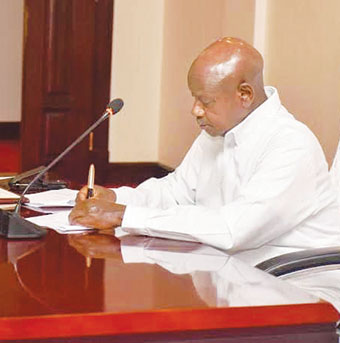Dear Mr President,
It is nearly three years since your staff called me twice to State House Entebbe in September 2020. That was 10 days after a friend told me State House was looking for my phone number so that you could meet me.
At the first invitation, you later directed that I come even if my Covid-19 results had been delayed. Although I came on the assigned date and time (with negative Covid-19 results), you attended to many other engagements till late, and promised to call me again. I left a number of documents for your study and to ease our anticipated discussion.
After four days, you invited me to come the following day. Your staff told me on phone, “His Excellency would like to have lunch with you tomorrow.”
Again, later, an abrupt programme made you stop me, promising that we would soon have an occasion to meet. Since then, I have not heard from you. Attempts to send you a reminder have been futile, hence the decision to channel this letter through a public platform; otherwise, there is no disrespect aforethought in this action.
I would like to inform/remind you that I personally had made several futile attempts to meet you since 1996, especially as regards assignments/memoranda I had agreed to before the start of the Luweero Triangle war, early 1981, and which I executed beyond expected scope and targets.
(Clandestine study groups at Makerere University soon sprouted into more groups outside and overt mass organizational work across the country in tens of secondary schools, colleges and rural and urban adult communities.)
In 1982, my father aged 65 left his wife and the rest of the family in Mbarara district to Mubende district in Luweero Triangle, staying in ekibaasi [makeshift grass-thatched tent] for years, returning after the war ended. The son he had migrated with left him after three years and joined the rebel army.
Strictly sticking to the key aspects of the unwritten memorandum of 1981, I have never lodged any complaint in public to enable me access you, even as I have been in the media for many years. I do recall a certain resident district commissioner in western Uganda (not my home district in Mbarara) in 2004 telling me how you asked him about my whereabouts that year when he mentioned my name in your presence.
“Where did that young man disappear to? I used to hear a lot about him in the public realm, but how did he disappear from the public radar?” he quoted you as having said.
When I was called to the National Honours and Awards Chancery (under the Office of the President) in Kampala to pick my invitation card to attend the Tarehe Sita day celebrations at Kasese in 2012, staff there narrated to me a story.
They said my name had been brought to the chancery by senior UPDF officers from the Office of the Commander in Chief; that the officers apologized for the delay in years to award me with a national medal and said I should be patient for a bigger, deserved and customized reward.
I attended the said Tarehe Sita day celebrations in Kasese where I received the Nalubaale Medal of Honour, with nothing else attached, not even transport refund. And as I requested in one of the documents I left at State House, I need a second meeting to introduce to you an elderly man from Kabale district that has a lot of lofty issues to tell you regarding the destiny of Uganda and Africa, as per divine revelations, with photographic evidence, which he has repeatedly had since 1974.
He even has specific roles for you to play in a gigantic and historic undertaking. It’s my prayer that this letter comes to your visual or reported encounter and elicits your due considered action. I am anxious to know what you wanted to tell or ask me in 2020. The Observer






